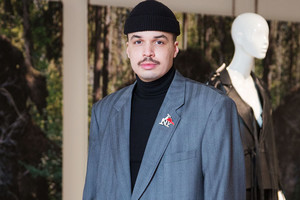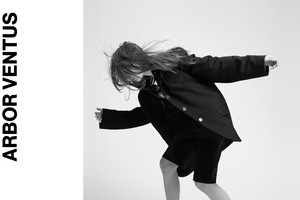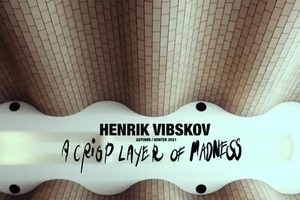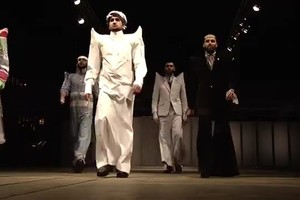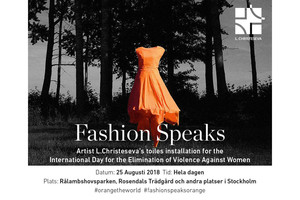The Artist and the Art, an interview with Carolina Falkholt
Written by Ludmila Christeseva by Thea UndemoCarolina Falkholt inaugurated nordic dust and rain season with the extravagant, mysterious and gracious transparency of her outfit. She met the audience of the CFHILL Art Space within the frameworks of her solo exhibition “You can dance in my park” / “Du får dansa i min park”, with the power of the beguiling female gaze - something that I am personally missing in Sweden. I enjoy the combination of an undefeated femininity, sexuality, and punk elements which take the form of elegant tattoos puncturing deep into the female skin.
What did you have for lunch today? Where do you stay?
I had oysters and I am staying at the Bank Hotel.
Oysters and champagne, perhaps?
No, actually I am not a drinker. Here, at the vernissage, we serve Kombucha to our guests. And some sweets, of course.
We sit on the sofa and this spontaneous conversation would last only for 10 minutes but reveal several intersecting aspects. Carolina is wearing a transparent long black dress made of sequin organza. Underneath one could witness black stockings with a floral motif. (Oh, I love stockings!) in fact, I am curious to learn more about this sensual fashion style and what inspires it.
My mother recommended me a fashion boutique where I found this dress. It is well suited for this exhibition project. It allows the focus to be on underwear. I also like the voluminous details which offer freedom and elegance to the movements.
This lovely hat was borrowed from my friend in New York and I still have to return it.
On one of her forefingers, Carolina has a motif that strongly reminds me of some patterns I could recall from the Soviet period. During the entire conversation, her hands speak with her, adding an artistic allusion to the moment. I also pay attention to the snake and sword on the one hand.
Observing Carolina’s heavily embellished fingers, my eyes were caught by one of her intriguing accessories. It was a ring made from a medal by a Belarusian jewelry designer, who had been wearing his own creation for twenty years before selling it to Carolina Falkholt. Being a Belorussian in my blood and soul, I was happy to find out that Carolina visited Belarus in 2011, where she was engaged in a graffiti project and met amazing artists and designers.
In Belarus, I made a graffiti work with my hands, each of them represented a letter and constituted my artist’s name or alias - Blue, which I use to sign my murals with. I remember that my work did not survive through time. It was painted over with simple geometrical shapes which could be perceived as an art movement per se.
Unfortunately, Carolina’s art piece “The Arcade Project”, committed by Y-gallery (Minsk, Belarus) didn’t remain in Belarusian art history. It was sanctioned by authority like many other artistic avant-garde interventions, once even including Marc Chagall.
Carolina is also aware of the current political situation in Belarus and expresses her support for the Belarusian women leading the revolution: “Dictatorship is something outmoded. Hopefully, the situation will change very soon. I still remember how dangerous it was for artists to be artists and this is still happening in Belarus today. I wish I could contribute”.
Graffiti is a language to reflect cultural conditions and social dynamics. It is also an efficient communication tool to reveal power structures in a society, provoking a variety of reactions. According to the curator Konul Rafieva, in September 2019 in Baku (Azerbadjan) by the invitation of the Swedish Embassy Carolina Falkholt would paint a Transgender mural, causing outrage in overwhelmingly patriarchal Azerbaijan. The Swedish artwork became considered not to confirm the cultural standards and was, therefore, removed before the festival even ended.
Autumn 2021, you will start the master program at Valand Academy and you just launched your first solo show in Stockholm at CFHILL Art Space, run by Anna-Karin Pusic, Michael Storåkers, and Michael Elmenbeck. There is a theory that art that belongs to the public spaces is impossible to scale down to a canvas format. We are also aware how free spirit get framed by institutions. What principles form your professional development?
Since my drawings consist of scales themselves, I don’t see the problem. The principles that frame me are in my work. The master program of Fine Arts is seen as a possibility to re-visit my work from an academic perspective. This is a possibility I am looking forward to. Perhaps, it is not for me. I don’t know, yet I feel inspired and curious.
Answering my question why there are not so many female artists joining the path of graffiti (or at least I personally do not know so many names, if someone asks me), Carolina Falkholt ensures me that there are many of them today, “But you don’t see them because they are all anonymous since they are out there illegally and hardcore.”
By then, a lot of people came to the exhibition’s opening despite heavy rain and Carolina was invited on the stage where she channeled her feminine voice through a dj controller turning it into a confession and a dialogue with another self. At that, neither style followed the frameworks of Swedish femininity nor her poem fitted into “the Swedish “lagom” format that implies just good enough”. I left the venue inspired and curious about Carolina’s next step of artistic development.
“Du får dansa i min park”, Carolina Falkholt
CFHILL Art Space
August, 27 – October, 2, 2021





